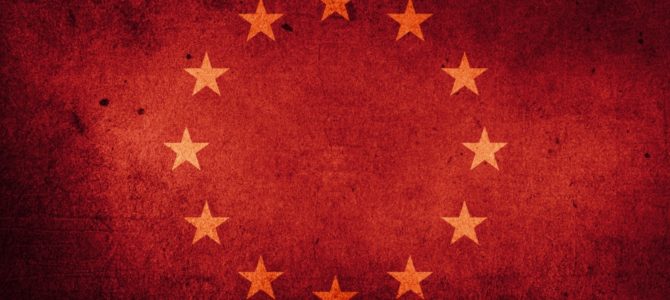
Joseph Borrell, a former Spanish socialist and current High Representative of the European Union, recently argued the EU needs to be strategically independent. “It is foreseen that in 20 years, we [the EU] will not represent more than 11 percent of world GNP, far behind China, which will represent double it, below 14 percent for the United States and at par with India,” Borrell wrote, adding the next two decades would be critical “because China will use them to become the first global power.”
Borrell’s statement is illuminating. For the first time, a high-ranking politician of the EU has publicly stated that the rise of China as the premier power of the world is not just happening, but it an inevitability. This implies, forebodingly, a decline of the United States.
Now, despite European academics warning against such an action, the European Union is inviting China for an investment deal — much to Washington’s impotent displeasure. France and Germany have both blessed the deal, showing some nominal Chinese concessions.
Meanwhile, Germany is proceeding with Huawei’s access in its 5G sector. True, after joint American and Australian pressure, Britain gave up on Huawei earlier this year, but Germany’s insistence on sticking with Huawei should be a clear sign to Washington, D.C. that real, tangible power has shifted.
As the Wall Street Journal recently reported, “The biggest victory in the U.S. lobbying campaign against Huawei came in the U.K., which has banned the purchase of Huawei’s technology beginning in January.” Yet that the German decision, led personally by Angela Merkel as a gesture to the United States, “marks a setback for the outgoing U.S. administration, which has lobbied European allies to reject Huawei’s technology.”
“For critics, it's a rushed deal that's too soft on labor rights. For Angela Merkel, it's a strategic win and icing on the cake of Germany's Council of the EU presidency.”https://t.co/yLM4vIZd2m
— Andreas Fulda (@AMFChina) December 30, 2020
This comes amidst and despite ongoing active aggressive Chinese intelligence bullying, which recently included a Chinese agent physically tailing a Czech cyber agency director in Prague. As if to rub it in even further, the EU responded to the incoming Biden administration’s request for a consultation on China with a confirmation of a deal with China.
Unlike Britain and Australia steadfastly aligning with the United States in preparation for a coming binary world, the EU is not. So it is time for America to take note, return the favor, and make the stakes clear to the EU.
Many commentators thought that, after the Cold War, permanent institutionalized peace in Europe would mean the entire continent would be both strong and subservient to the United States. In reality, like most great powers throughout history, the EU turned into a quasi-empire, with independent interests rapidly diverging from the United States.
While the classical British grand strategy for 500 years was always cognizant of the danger of a united European mainland — and therefore understood that “divide and rule” was a cynical but better option to maintain a favorable balance of power — their modern American counterparts were more faithful to their providential understanding of geopolitics.
American policymakers now face hard choices, but that is also partly due to a still pervasive belief in an inevitably positive and peaceful arc of history. Yet the paradox in American policy towards Europe is that policymakers in D.C. expect the EU to be both independent as an ally and have similar interests as the United States. That is, historically speaking, rarely the case.
There are largely pro-American countries within the EU, and there are virulently anti-American countries. To unite them all together under one flag and one umbrella means the chance those who are anti-American might have power someday.
Consider the historical British grand-strategy whenever there was a singular hegemonic continental power. Britain supported the Dutch against the Spanish, Austria against Napoleon, and France against both Kaiser Wilhelm II and Adolf Hitler. American grand strategy was originally similar, supporting Western Europe against the Soviets. This changed, however, post-Cold War, with a Clintonian democratic peace theory that forgot the rules of realpolitik in favor of institutionalizing a hegemon in the form of the EU.
Has anyone considered the possibility of the enormous accumulated power that would be opposed to the United States if the EU and China are aligned? What that would mean for American companies and trade? To give just one example, the biggest power the United States still possesses is the ever-looming threat of sanctions against an adversary. Yet that would be effectively meaningless if a united Europe refuses to comply with American demands in the future.
There was a logic in the British “divide and rule” policy. Compared to a lot of Eastern European countries, Britain was in a better position to unilaterally move out, given British economy and military power, something a lot of smaller countries are not capable of. American strategists worth their salt would start thinking about how to exploit these rifts within the EU.
To have a united Europe side with China would mean the end of American hegemony in the western hemisphere. The threat that the mostly pro-American Eastern EU countries face is from both Russia and a hegemonic EU. America should use that and pry open the centrifugal forces within the EU, or at least threaten the EU leadership of the consequences of aligning with China.
Given that it is the EU’s explicit intention to be a third pole between the United States and China, as Borrell recently said, one might argue they are aligning with China on purpose. In that scenario, a potent threat from the American side would be to pull back all troops out of Europe and let Europeans defend themselves against Russia.
Under no scenario would a unified EU with enormous trade and military power be in the interest of America. It is time to think in grand-strategic terms and consider the possibility that a united EU might not be an ally. Indeed, to help it further unite would be an extraordinary blunder.









